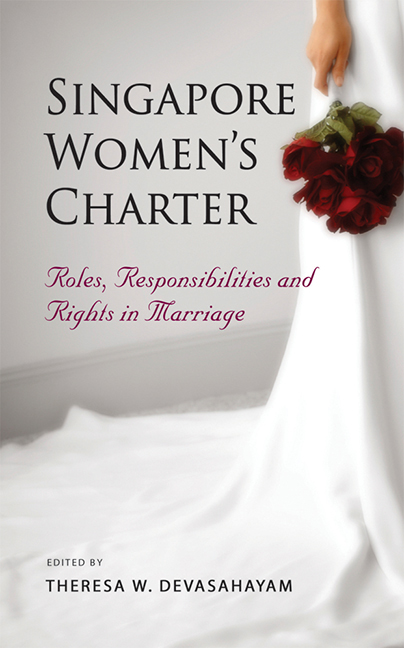Book contents
- Frontmatter
- Contents
- Contributors
- Foreword
- Keynote Address
- 1 Legal Mechanisms for Protecting Women's Rights: Examples from Southeast Asia
- 2 The Women's Charter, 1961: Where We Were Coming From and How We Got There
- 3 Significant Provisions in the Women's Charter
- 4 A Lawyer's Perspective on How Divorcees View the Women's Charter
- 5 “The Morning After”: Understanding and Exploring the Psychosocial Impact of the Women's Charter on Families Experiencing Domestic Violence
- 6 Epilogue: Some Thoughts on Protecting Women's Rights in the Family and Beyond
- Index
5 - “The Morning After”: Understanding and Exploring the Psychosocial Impact of the Women's Charter on Families Experiencing Domestic Violence
Published online by Cambridge University Press: 21 October 2015
- Frontmatter
- Contents
- Contributors
- Foreword
- Keynote Address
- 1 Legal Mechanisms for Protecting Women's Rights: Examples from Southeast Asia
- 2 The Women's Charter, 1961: Where We Were Coming From and How We Got There
- 3 Significant Provisions in the Women's Charter
- 4 A Lawyer's Perspective on How Divorcees View the Women's Charter
- 5 “The Morning After”: Understanding and Exploring the Psychosocial Impact of the Women's Charter on Families Experiencing Domestic Violence
- 6 Epilogue: Some Thoughts on Protecting Women's Rights in the Family and Beyond
- Index
Summary
Introduction
Family violence is a complex issue relating to the breakdown of an intimate relationship. Former Senior District Judge Richard Magnus (2003) recognizes family violence as:
… a complex criminal offence that has the seriousness of a stranger-to-stranger crime but involves a victim and a perpetrator who know and care for one another. A person subject to family violence in the home is no less a victim than a person beaten on the sidewalk in front of the home. The law does not stop at the front door of the family home.
In the last fourteen years, the amendments to the Singapore Women's Charter have tightened the law to accord not only more protection for victims, but also help for families through the provision of counselling orders. At the same time, there have been efforts to increase public awareness and interagency networking initiatives at the macro level to address this problem.
In situations of family violence, the perpetrators of violence find themselves in a peculiar and contradictory situation. In the aftermath of the violent act, the perpetrators, seeing the outcome of the violence, are forced to confront the truth of their vicious nature. However, they invariably cannot accept it and end up dismissing it. They are unable to make sense of their violence and to place it in terms of a reality they can live with (Eisikovits and Buchbinder 2000).
Contrary to the popular notion that family violence ends in the break-up of marriages, most couples in a violent relationship in Singapore have been found to want to save their marriages. An evaluation study of the Mandatory Counselling Programme commissioned by the Ministry of Community Development, Youth and Sports (MCYS) in 2004 indicated that seven out of ten survivors of violence stated that their lives had improved and decided to remain in their marriages after undergoing the programmes (MCYS 2007a, b). However there are also instances where the couples may decide the marriage is not worth saving and end up in divorce or separation.
- Type
- Chapter
- Information
- Singapore Women's CharterRoles, Responsibilities and Rights in Marriage, pp. 147 - 178Publisher: ISEAS–Yusof Ishak InstitutePrint publication year: 2011



